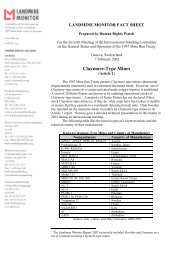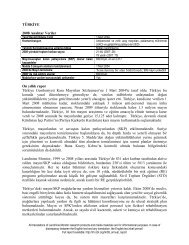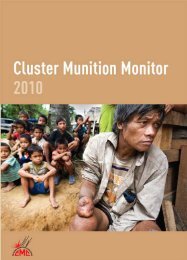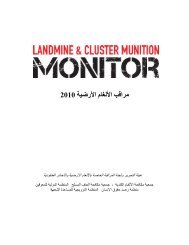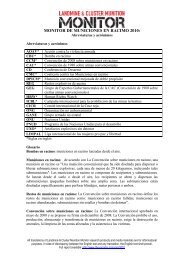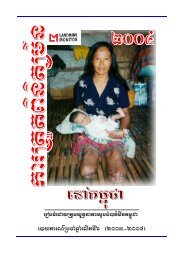Download PDF - Landmine and Cluster Munition Monitor
Download PDF - Landmine and Cluster Munition Monitor
Download PDF - Landmine and Cluster Munition Monitor
You also want an ePaper? Increase the reach of your titles
YUMPU automatically turns print PDFs into web optimized ePapers that Google loves.
<strong>Cluster</strong> <strong>Munition</strong> <strong>Monitor</strong> 2012<br />
placing responsibility on all States Parties, <strong>and</strong> not just those with cluster munition victims, for promoting the participation<br />
of cluster munition victims.<br />
Of the seven States Parties with victim assistance coordination structures in place, six involve survivors or their<br />
representative organizations in victim assistance or disability coordination mechanisms. 44<br />
Among signatory states, only in DRC did survivors participate actively in regular coordination mechanisms. In<br />
Colombia, survivor participation was extremely limited within the ongoing coordination. Both coordination <strong>and</strong> survivor<br />
participation were limited in the other four signatories: Angola, Chad, Iraq, <strong>and</strong> Ug<strong>and</strong>a.<br />
In 13 of the 16 States Parties <strong>and</strong> signatories with known cluster munition victims, survivors were involved in ongoing<br />
victim assistance activities. 45 Survivors implemented, <strong>and</strong> in some cases helped to design, physical rehabilitation <strong>and</strong><br />
social <strong>and</strong> economic inclusion initiatives. Survivors provided peer support <strong>and</strong> referrals to help other survivors to access<br />
services in many countries with cluster munition victims, including in Afghanistan, Albania, Angola, BiH, Croatia,<br />
Ethiopia, Mozambique, Ug<strong>and</strong>a, <strong>and</strong> Vietnam. In almost all identified cases, survivor involvement in the implementation<br />
of victim assistance activities was through NGO programs <strong>and</strong> most often these were countries where survivor networks<br />
also existed. 46<br />
As highlighted by the Vientiane Action Plan, survivors <strong>and</strong> cluster munition victims should be considered as experts<br />
in victim assistance <strong>and</strong> included on government delegations to international meetings <strong>and</strong> in all activities related to<br />
the convention. BiH was the only State Party known to have included a survivor as a member of its delegation to an<br />
international meeting of the convention in 2011 <strong>and</strong> the first half of 2012. By contrast, many cluster munition victims<br />
have participated in international meetings as part of the <strong>Cluster</strong> <strong>Munition</strong> Coalition delegation.<br />
Providing adequate assistance: key indicators <strong>and</strong> challenges<br />
States <strong>and</strong> areas with cluster munition victims continue to face significant challenges in providing holistic <strong>and</strong> accessible<br />
care to affected individuals, families, <strong>and</strong> communities. Each State Party should take immediate action to increase<br />
availability <strong>and</strong> accessibility of services, particularly in remote <strong>and</strong> rural areas where they are most often absent.<br />
Economic <strong>and</strong> psychological needs remain the least fulfilled by existing services <strong>and</strong> the <strong>Monitor</strong> has not identified any<br />
recent efforts by States Parties to address the gaps in these areas.<br />
All States Parties continue to provide some form of victim assistance services despite reliance on international funding<br />
<strong>and</strong> the poor global economic outlook. However, in the two years since the convention entered into force on 1 August<br />
2010, few significant or readily measurable improvements in the accessibility of services have been recorded in States<br />
Parties or signatories with cluster munition victims.<br />
Some accomplishments were identified in States Parties during 2011:<br />
• In Afghanistan, physical accessibility continued to improve due to the work of NGOs with the cooperation<br />
of local authorities; 47<br />
• In Albania, the national victim assistance NGO provided some sustained economic reintegration assistance<br />
to survivors throughout the year, while international financial support decreased significantly following the<br />
completion of clearance activities. 48<br />
• In BiH, the national survivor NGO was able to provide support to all new mine/ERW casualties, while state<br />
authorities continued to provide economic reintegration support; a new victim assistance fund was in its first<br />
year. 49<br />
• In Croatia, psychosocial support increased through the work of NGOs as planned in the national victim assistance<br />
strategy. 50<br />
• In Guinea-Bissau, the national rehabilitation center reopened following a renovation completed with the support<br />
of the Economic Community of West African States (ECOWAS) <strong>and</strong> the ICRC. 51<br />
• In Lao PDR, access to medical care <strong>and</strong> prosthetics services also improved in remote areas through outreach<br />
programs. 52<br />
44<br />
No survivor involvement was identified in Guinea-Bissau’s planning <strong>and</strong> coordination mechanisms.<br />
45<br />
No survivor involvement in victim assistance activities was identified in Guinea-Bissau, Montenegro or Sierra Leone.<br />
46<br />
See <strong>Monitor</strong> victim assistance country profiles, www.the-monitor.org.<br />
47<br />
Email from Chris Fidler, Afghanistan Country Director, Clear Path International – Kabul, 30 May 2012.<br />
48<br />
Email from Jonuz Kola, Executive Director, Albanian Assistance for Integration <strong>and</strong> Development (ALB-AID), 19 July 2012; Statement of<br />
Albania, Convention on <strong>Cluster</strong> <strong>Munition</strong>s Working Group on Victim Assistance, Geneva, 16 April 2012.<br />
49<br />
Statement of BiH, Mine Ban Treaty St<strong>and</strong>ing Committee on Victim Assistance <strong>and</strong> Socio-Economic Reintegration, Geneva, 22 June 2011;<br />
<strong>and</strong> Anes Alic, “BiH disabled needs lack initiative,” SETimes, 28 January 2012. http://bit.ly/Oyc701.<br />
50<br />
ITF, “Annual Report 2011,” Ljubljana, 2012; email from Marija Breber, MineAid, 2 June 2011; Croatia, Convention on <strong>Cluster</strong> <strong>Munition</strong>s<br />
Article 7 Report, (for the calendar year 2011), Form H; <strong>and</strong> Croatia, Mine Ban Treaty Article 7 Report, Form J, 10 April 2012.<br />
51<br />
Email from César de Carvalho, General Director, National Mine Action Authority (CAAMI), 3 August 2011.<br />
52<br />
Interview with Bountao Chanthavongsa, Victim Assistance Officer, National Regulatory Authority for the UXO/Mine Action Sector in the<br />
Lao PDR (NRA), Vientiane, 23 March 2012; email from Courtney Innes, UXO Victim Assistance Technical Advisor, NRA, 9 July 2012; <strong>and</strong><br />
Email from Kerryn Clarke, Project Coordinator, COPE, Vientiane, 3 July 2012.<br />
58



